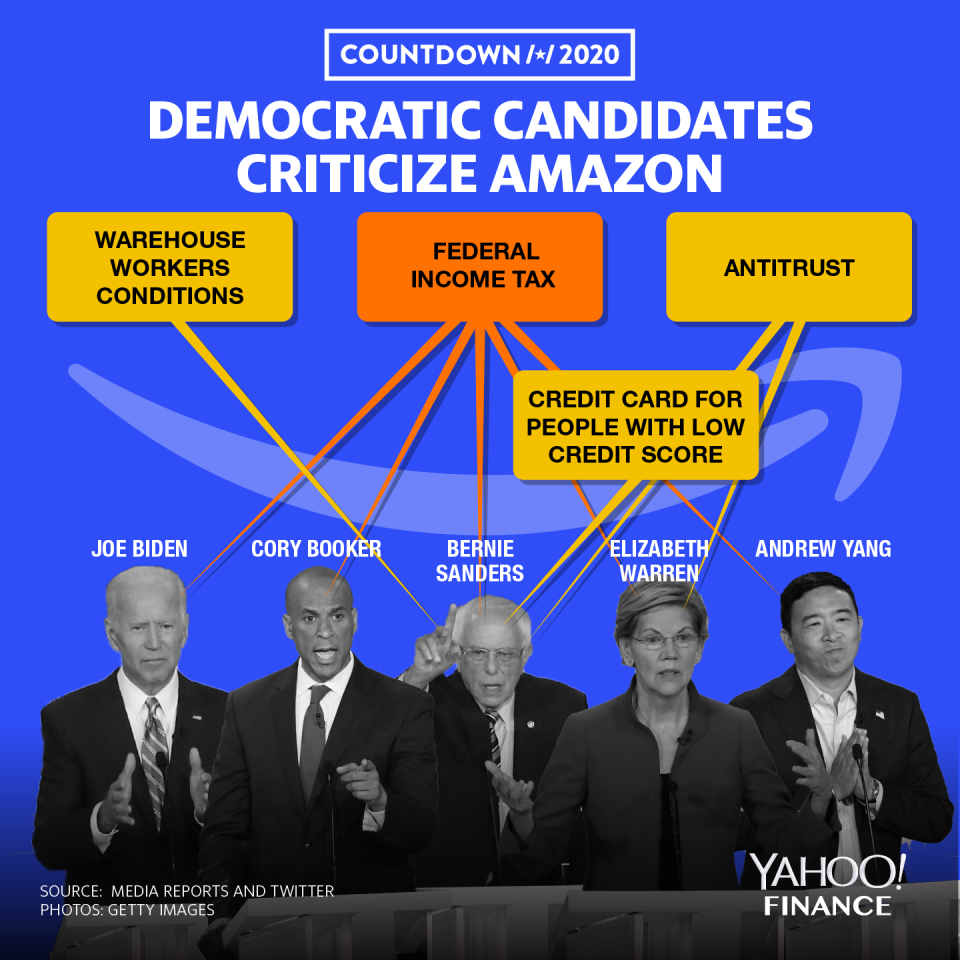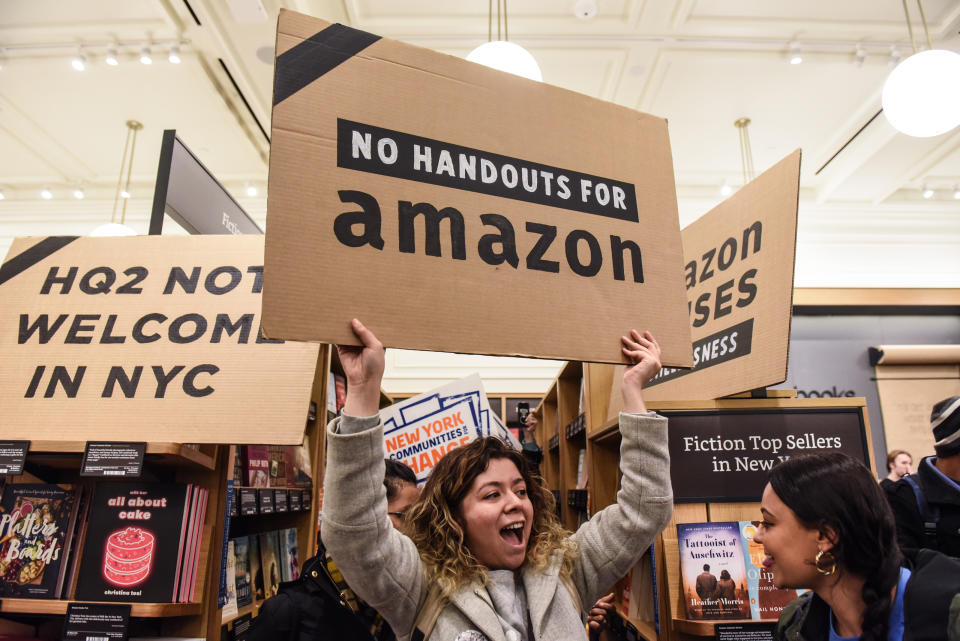Amazon called out for ‘tax evasion’ at Democratic presidential debate
What do President Donald Trump and major Democratic candidates Joe Biden, Elizabeth Warren and Bernie Sanders have in common? Well, they are all outspoken critics of one company — Amazon (AMZN).
During Thursday’s Democratic primary debate, Amazon was the only tech giant that was name-dropped by 2020 presidential candidates.
Senator Cory Booker and entrepreneur Andrew Yang both called out Amazon’s “tax evasion scheme,” the same issue former U.S. Vice President Joe Biden criticized earlier this month. Senator Elizabeth Warren reiterated her plan to break up Big Tech. Other candidates have voiced their criticism early on in their campaigns. Senator Sanders and Congresswoman Alexandria Ocasio-Cortez have united in slamming Amazon’s treatment of workers and the company’s latest, high interest credit card offering designed to help people “build credit.”
As one of the most valuable companies in the world and the second largest private employer in the U.S., Amazon has come under fire as Washington increasingly scrutinizes Big Tech and progressive Democrats try to address income inequality and engage grassroots workers.
“Conservatives and liberals have found reasons to criticize the power of this company,” Julian Zelizer, a political historian at Princeton University, spoke of Amazon. ”The main reason it finds itself in this position is its sheer power across numerous sectors of the economy. It is not just a big player in the market, it is one of those companies continually remaking the markets and leaving competitors in the dust.”
Being grilled by prominent political figures is nothing new for the e-commerce giant. The president has had a long feud with Amazon: Trump has attacked Amazon on state sales tax issues and USPS delivery subsidies. Amazon CEO Jeff Bezos’s ownership of the Washington Post has also been an added impetus for Trump, who regularly condemns the media.
Being under the spotlight and attacked from all fronts reflects the sheer size and impact of the Seattle-based company, according to experts. The business empire from retail to cloud services places Amazon at a special crosspoint between big retailer and powerful tech hub.
“They're unique in the attention that they've been receiving from members of Congress, but that is because of the size of the company and the way that Amazon has really changed the American economy and the impact it's had across the board on the way everybody does business,” said Jonathan McCollum, a lobbyist at a Washington-based law firm Davidoff Hutcher & Citron, noting how Washington is very aware of Amazon’s power.
Amazon accounts for over one-third of the e-commerce market in the U.S., according to recently revised data from eMarketer. It has changed the way people shop for books and household products, and many believe it will have the power to disrupt other areas of life. In the stock market, an Amazon effect is felt by competitors, whose stock gets hammered when Amazon announces its entry into an industry.
Political punching bag

With the 2020 presidential election quickly approaching, Amazon becomes an easy target beyond its business impact. With the majority of its 600,000 global workforce working in warehouses and thousands of contractors, Amazon is building out a nationwide logistic system to power its Prime delivery promise.
The company’s employment of blue-collar workers differentiates Amazon from other Silicon Valley giants like Google (GOOG, GOOGL) and Facebook (FB), and also opens a new front for politicians to speak up for grassroots employees and appeal to their voter base, according to Joe Trippi, a long-time Democratic political strategist.
“There's a wing in the party that clearly believes and insists on taking on income inequality. Bigger examples of that, to them, are people like Bezos and companies making billions of dollars and they're not paying taxes, while the workers are making $15,” Trippi said. “If Bernie becomes the presidential nominee, that would signal that he's succeeded in convincing a lot more people out there that he's right about all this.”
Sanders has been outspoken about Amazon’s worker conditions and asked employees to share their experiences working for Amazon with him. He gave out rare raises when Amazon raised the minimum wages of workers to $15 per hour last November.
Politicians trying to connect with workers at Amazon is similar to what they attempted to do with employees at Walmart, the largest private employer in the U.S., whose sales associates have never successfully unionized.

Another flashpoint of controversy was Amazon’s year-long high-profile search for HQ2. While the search may have helped Amazon secure a good deal of valuable data about American cities, the tax incentives the company received from selected cities generated major backlash. The pushback was especially dramatic from Ocasio-Cortez and other local politicians in New York City. Amazon eventually pulled its plans to build HQ2 in New York after picking it and Crystal City, Virginia out of more than 20 contenders.
“The ultimate outcome whether it's Q2 search and the way that New York kind of fell apart was a tremendous embarrassment to the company that opened the door for more critics of the government,” said Tom Forte, senior research analyst at D.A. Davidson.
Antitrust issues may be the most serious
Among all the concerns posed by politicians, the most serious one, according to analysts, are antitrust investigations that could potentially change Amazon’s entire business.
“If any antitrust case were based on influence, Amazon is ripe for one,” analysts at D.A. Davidson wrote in May. Amazon has a large and broad influence — thanks to the scale of its e-commerce space, advertising efforts, and tremendous data — on consumers' buying habits and personal habits.
Amazon is not keen about the idea of spinning off its booming Amazon Web Services (AWS) unit. The Federal Trade Commission is looking into Amazon’s business practices, paving the way for a future antitrust investigation. Forte said the big risk for Amazon is on data, which is Amazon’s “secret sauce” in retail.
“I think that investors in general are going to have to get to the new normal, which is regulatory scrutiny or regulatory risk, and then also Amazon essentially being a punching bag for political candidates from both parties,” said Forte.
Krystal Hu covers technology and China for Yahoo Finance. Follow her on Twitter.
Read more:
New bipartisan bills threaten Chinese IPOs and Chinese companies listed in the U.S.
Huawei is still winning 5G contracts around the world despite the U.S. ban
Read the latest financial and business news from Yahoo Finance
Follow Yahoo Finance on Twitter, Facebook, Instagram, Flipboard, SmartNews, LinkedIn, YouTube, and reddit.

